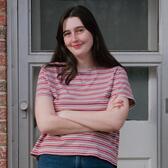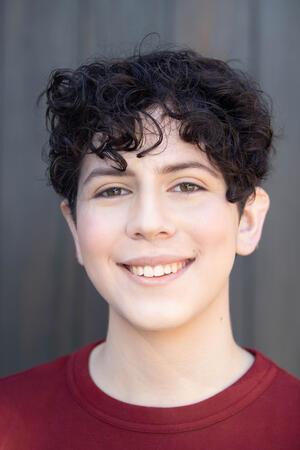7 Questions for Rachel SJ
JWA sat down with nonbinary Jewish actor and artist, Rachel SJ. After graduating from Northwestern with a BA in Theatre, the Henry Luce Foundation selected them as a Luce Scholar for a year of theater work in Thailand. They now help tell stories in film and TV in LA.
JWA: As an actor, what is your dream role?
RSJ: I’ve played him before, but playing him made my heart sing and I would love to be Yitzhak from Hedwig and the Angry Inch again. Being in art like Yentl, Crazy Ex-Girlfriend, Indecent, Transparent, or Fiddler On the Roof would be wonderful. Not that I only play queer and/or Jewish characters, but there is something so fulfilling about sharing our stories ourselves, especially through music. I’d also love to be in a comedy series that leans fully into the ridiculous, like Our Flag Means Death or What We Do In The Shadows.
JWA: Who is your favorite Jewish composer or singer?
RSJ: Well isn’t that tough to pick?! There’s so many greats. I’ll stick with three—I love Amy Winehouse, Bob Dylan, and Debbie Friedman!
JWA: As a SAG Eligible artist, you’ve been on the picket lines and are a vocal supporter of the WGA/SAG-AFTRA strike. Why is the strike important to you, and how can folks not involved in the entertainment industry support it?
Rachel SJ: At the core of these strikes is protecting these professions and making them sustainable and livable for the artists. Especially with developments in AI, clear boundaries are absolutely necessary to safeguard these workers and the creative process. Unfortunately, as an actor, I have been digitally scanned with no additional pay or terms set before, which this new contract can prevent. I feel hopeful that this is a turning point for the industry and that the solidarity and strength I’m feeling on the picket lines continues to lift up other workers too.
For those not involved in the entertainment industry, you can still show up to pickets, post in solidarity about the strike, donate to the Entertainment Community Fund or The Union Solidarity Fund, and stay updated on and follow guidance from the unions. If the unions have additional calls to action, getting it straight from them is the best way!
JWA: Your TikTok has nearly 70,000 followers and is a delightful combination of song covers, comedy, activism, and Jewish education. How do you balance content creation and your mental health?
RSJ: I like to invest inother art forms that rejuvenate me, like the album I’m finishing right now. Some of the videos I’ve done require significant work even before filming. Then, when my videos get a lot of views, I can receive a lot of hate just for being Jewish, queer/trans/nonbinary, or all of the above. Plus, TikTok’s content moderation is not great. I used to really push myself to put out a certain amount of content or fulfill every request I could manage. Letting go of those expectations has made it more enjoyable, and now when I make a video, it’s because I had the time/energy/inspiration/drive. It also helps to handle the hate with humor where possible.
JWA: You also have experience with art direction and set dressing. What was your favorite set you’ve worked on, and how did you go about building that world?
RSJ: I think my favorite set to date is an indie horror comedy KillHer that I worked on with a tiny crew in Big Bear, [California]. We all stayed at the filming location, so we had plenty of time to get to know each other well. It was a really efficient and capable group which left space for a goofy and fun atmosphere on set.
In building the various parts of that world, we started from the intended impact, the feeling of the space, and the details of the characters and context. There’s one building [in the film] that outside is initially threatening and desolate, but inside becomes cozy and inviting. We had to find foreboding elements for the porch that could be justifiable once the context flipped. Dressing [the porch] softened the space once we saw outside again, [but wasn’t] initially noticeable.
JWA: You lived in Thailand for a year, working in theater under a Henry Luce Foundation scholarship. What was the most surprising difference between Eastern and Western theater practices?
RSJ: I’ll speak to an experience as a participant in a physical theater workshop at Makhampom Art Space that shifted my perspective. All participants were given the same straightforward instructions: Walk around the space carrying a stick. As I walked, I began to play with different ways to follow the instruction. In my American classes, “Walk around the space while doing ___” was often used for individual exploration, then bringing any findings back to the group. When we paused, the instructor clarified that it was a collective process where the gesture and meaning is being created by the entire group in unison. When we split into two groups, I got to observe and better understand. I realized my initial impulse was to start separately and then expand and connect, but it was the power of the collective, creating and moving as one, that allowed the audience to see or assign meaning.
JWA: In what spaces do you feel like your queer and Jewish identities both shine?
RSJ: My immediate thought is nature. There is something very grounding and freeing about being in nature, and it’s been one of the spaces where I feel most connected spiritually. There’s a certain awe and scale that puts things in perspective and invites you beyond yourself.
I also [feel connected to these identities in] explicitly queer Jewish spaces like a Shabbat group of queer Jews I attend. Doing the Shabbat rituals together followed by a queer parshah skit is simply delightful. There’s very little pressure to be anything other than what I am in both of those settings. If anything, all that I am is celebrated there.







